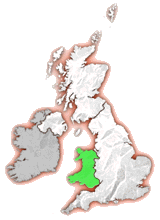

A country known as "And Wales" |
Welsh DevolutionBriefing by Vaughan Roderick, Welsh Affairs Editor, BBC Wales
|
Introduction: Devolution in Wales
People who live to the west of Offa's Dyke could be forgiven for believing they inhabit a country called "And Wales". They have been familiar for years with hearing themselves referred to as resident in Englandandwales....they find themselves in the devolution debate inhabiting the new country of Scotlandandwales. In fact the government's proposals for the two countries are profoundly different, as are the Welsh and Scottish political cultures and histories.To understand the current debate one needs to understand how the present settlement between the countries of Britain came into being.
While Scotland (albeit to the accompaniment of rioting) voluntarily entered the union - a new country with a new name - Wales, centuries earlier, had been "forever and henceforth annexed into this Kingdom of England". While Scotland maintained its own institutions, Wales in any constitutional sense ceased to exist in the centuries following the death of the last prince in 1282.
It wasn't until the days of the young Lloyd George that the Wales began to be treated as separate entity within the UK. It is sometimes difficult today to appreciate how recent many developments in the government of Wales are. In the last 100 years the following milestones are worth noting:
- 1922 Dis-establishment of the Church in Wales...a far more important issue than Home Rule to Victorian Nationalists
- 1950s The first Minister for Welsh affairs appointed and the first Welsh Home Rule bill discussed by parliament
- 1964 Establishment of the Welsh office and the post of Secretary of State for Wales
- 1967 Establishment of the Crowther (later Kilbrandon) Royal Commission on the constitution
- 1975 Establishment of the Welsh Development Agency
- 1980 Establishment of the Welsh Affairs Select Committee
- 1982 Establishment of the (pre-dominantly Welsh language) S4C television channel and transfer of further functions to the Welsh Office
Despite the abject failure of the proposals for a Welsh assembly in the 1970s the process of devolution has continued unabated for the last forty years under all governments. In a sense for the first time in eight centuries a "Welsh State" has been constructed.
The Devolution argument in Wales is about the accountability of that "state" rather than about nationalism. Opponents of the governments proposals support the devolution that has taken place thus far but believe existing mechanisms are adequate for its control. Proponents of further devolution claim that there is a democratic deficit waiting to be filled.
While the political histories of Wales and Scotland are hugely different so are their badges of national identify. Wales is, and always has been, a divided country with jealousies and disputes between different areas, groups and language communities.
Yet, deprived of national institutions, it is undoubtedly the survival of a separate Welsh Culture that has kept the "question of Wales" alive. After all it's difficult to believe yourself "forever annexed" while you maintain your own language, culture and social values.
The purpose of the following pages is not to analyse the contents of the White Paper. It is rather to put the present proposals in context - particularly by comparing them to those of 1979 and by examining the political forces likely to decide the referendum result.
-
1. 1979 and all that
A comparison of the 1979 and 1997 proposals and campaigns -
2. Wales and Westminster
The relationship of the Assembly to Westminster and possible future conflicts -
3. At what cost?
The cost of an Assembly -
4. You decide
The Referendum -
5. Yeah or Nay
The two campaigns -
6. What if?
Post-referendum scenarios


